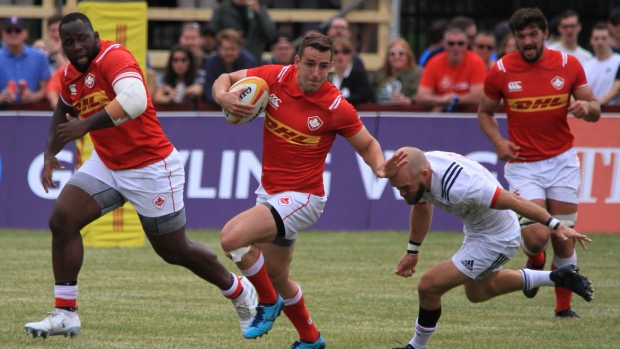Nov 1, 2018
Rugby Canada strikes deal with sevens players, ending two-month boycott
Rugby Canada and its disgruntled sevens players have come to an agreement ending the player boycott.
The Canadian Press

Rugby Canada and its disgruntled sevens players have come to an agreement ending the player boycott. But while they are back in the fold, it appears there may be more work needed to mend their differences.
Thirteen players including co-captains Nate Hirayama and Harry Jones have boycotted training since their contracts ended Aug. 31, unhappy at the new offer and training conditions. The players, who had been practising by themselves, returned to training Thursday at the Al Charron Rugby Canada National Training Centre in Langford, B.C.
Time is of the essence. The HSBC World Rugby Sevens Series season opens Nov. 30 in Dubai.
A spokesman for the sevens players said they signed contracts "reluctantly and under protest" to get back on the field. Backers of the sevens squad have formed a support group to provide assistance for the sevens side of the game.
Sevens coach Damian McGrath, who was essentially desk-bound during the dispute, is back in charge of the squad.
The two sides had been at odds since Rugby Canada announced in early August that it would have one centralized player pool rather than separate sevens and 15s squads.
"We're obviously very pleased to have them back," Rugby Canada CEO Allen Vansen said in an interview.
Vansen said while the agreement isn't fundamentally different with the centralized player pool still in effect, issues such as appearance fees and performance bonuses have been renegotiated.
"We're quite pleased with where they are," he said.
The new player agreement will be effective dating back to Oct. 1.
The sevens players are continuing with their bid for union certification, making their case to join the United Steelworkers of America before the B.C. Labour Relations Board.
While Rugby Canada supports the concept of a player association, it opposes the unionization bid.
The two squads had previously trained apart in Langford with separate coaches — with some 17 carded athletes in the sevens squad and up to 30 non-carded players in the 15s — although there has been some movement between the two.
The sevens players were upset at changes in their player contract — for example, their appearance bonus for playing in the hugely successful Canada Sevens in Vancouver dropped to $500 from $5,000 in the original offer.
The sport's governing body was looking to make the most of both its talent and financial resources. But the changes irked the sevens players, who felt their game was being marginalized
Rugby Canada says its bottom line is built on World Rugby funding contingent on qualifying for the Rugby World Cup, necessitating a focus on the 15s game. But it said it would maintain its support for sevens.
"Still no agreement. Still no respect. Still being 'disincentivized.' Still not just a development tool. Still standing together," Hirayama tweeted Oct. 13 above a photo of his team standing arm-in-arm on the field.
Those in the sevens camp, whose ultimate goal is Olympic qualification, pointed to the different demands of the sevens game and said specialized training is needed. They also noted the rising popularity of the sevens game.
"It's 2018. 7s is no longer just a development tool. We have to get with the times or we're going to get left behind," Hirayama tweeted Sept. 4 above a picture of the Canadian team celebrating its victory at the 2017 Singapore Sevens.
The 15s stalwarts played down the need for special sevens training and pointed to the worldwide roots of the traditional version of the game.
The Canadian men's sevens squad finished ninth on the World Series circuit last season.
The Canadian men 15s side, which has never failed to qualify for the World Cup, is headed to a last-chance repechage tournament in France this month for its third and final attempt to crack the field for the 2019 World Cup.
Coach Kingsley Jones opted not to select any of the boycotting sevens players for the repechage, saying it would not be fair to those who had trained.
Canada lost earlier World Cup qualifying series to the U.S. and Uruguay.
Follow @NeilMDavidson on Twitter
